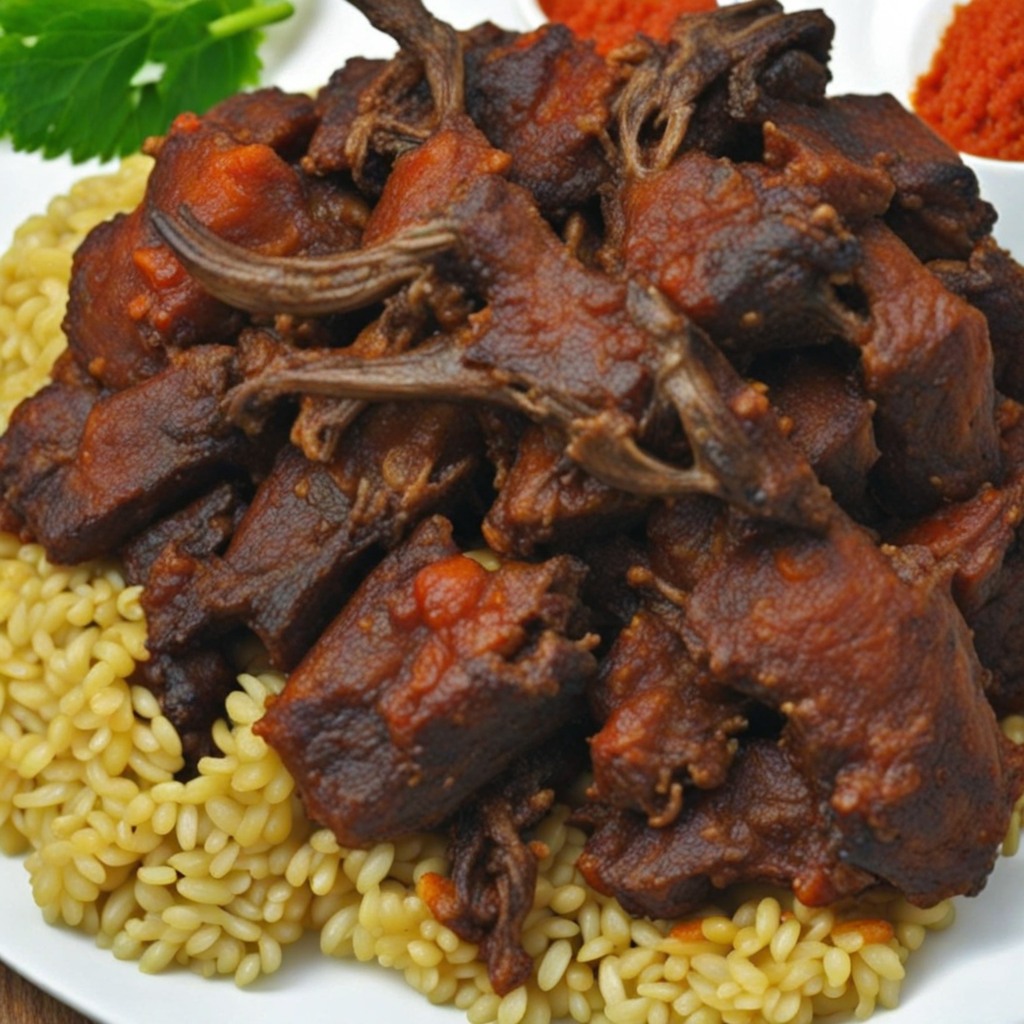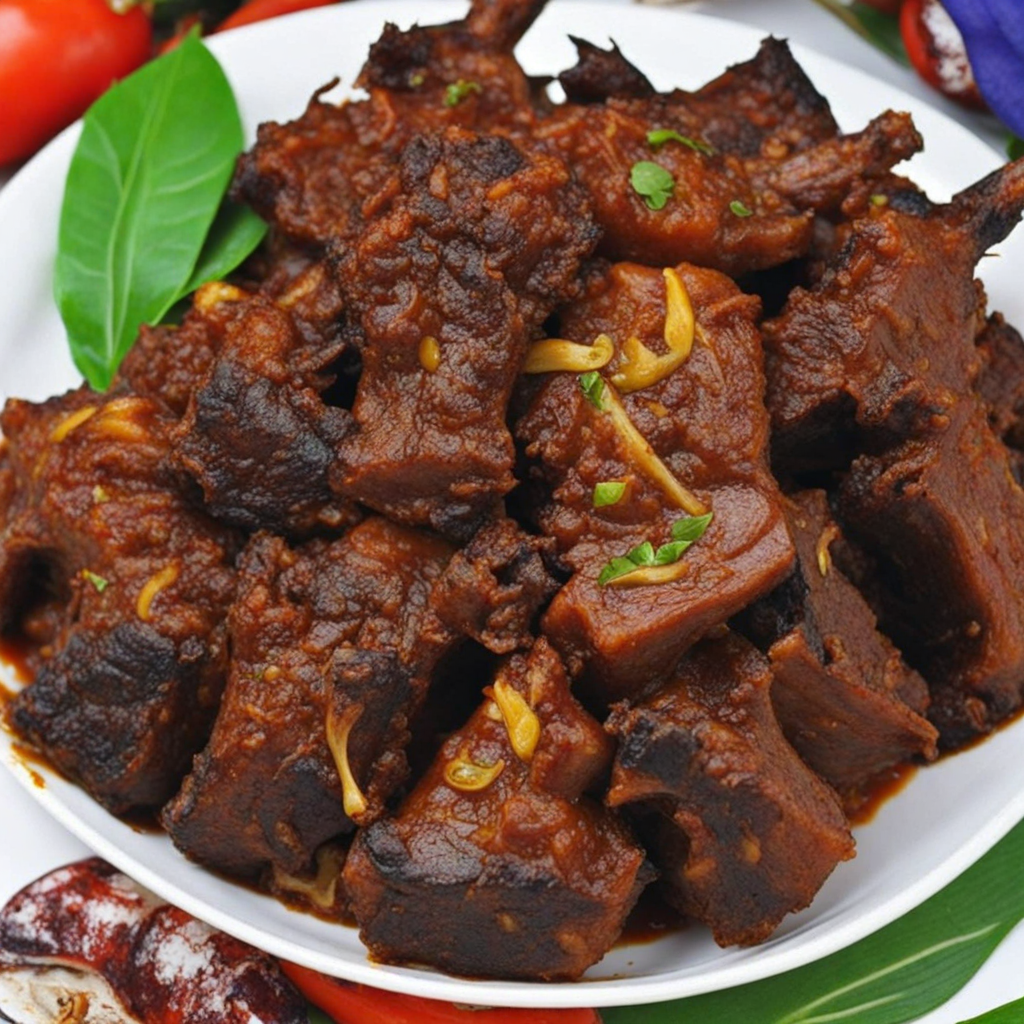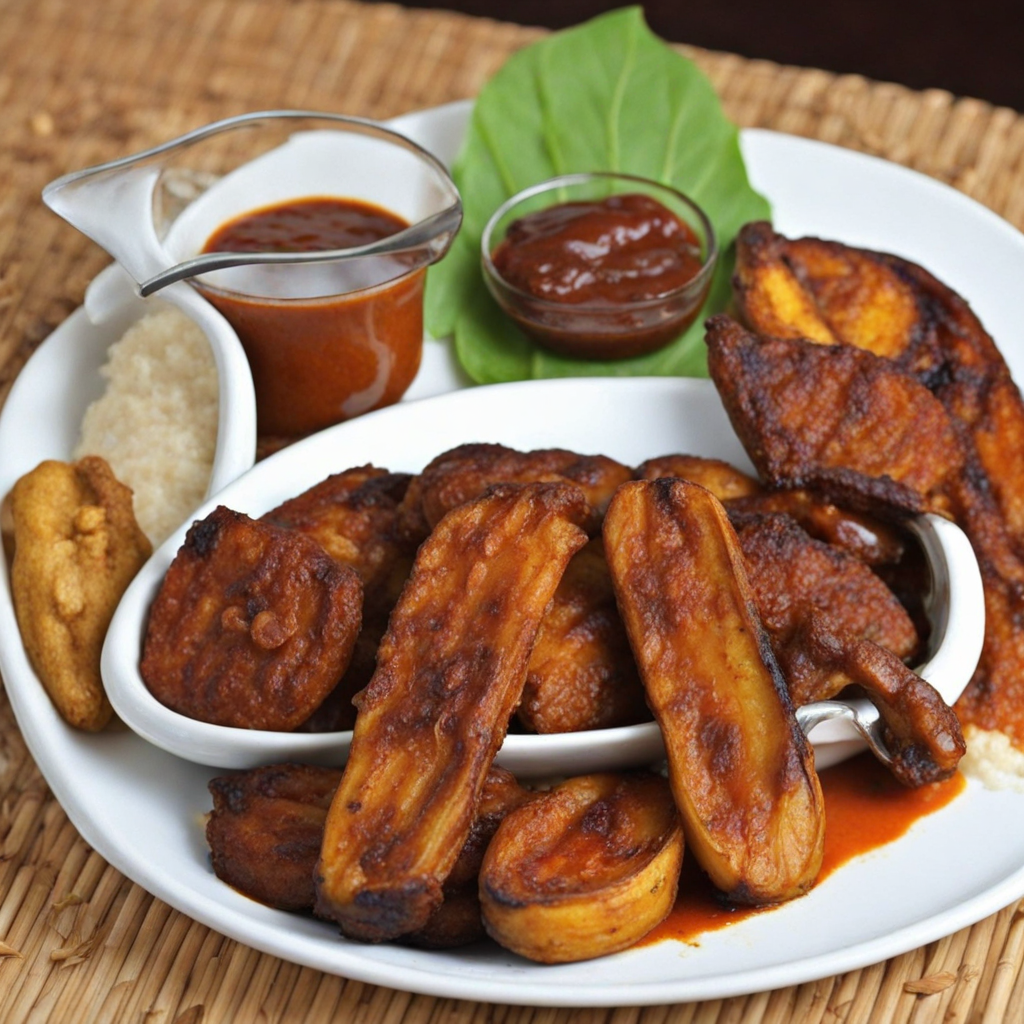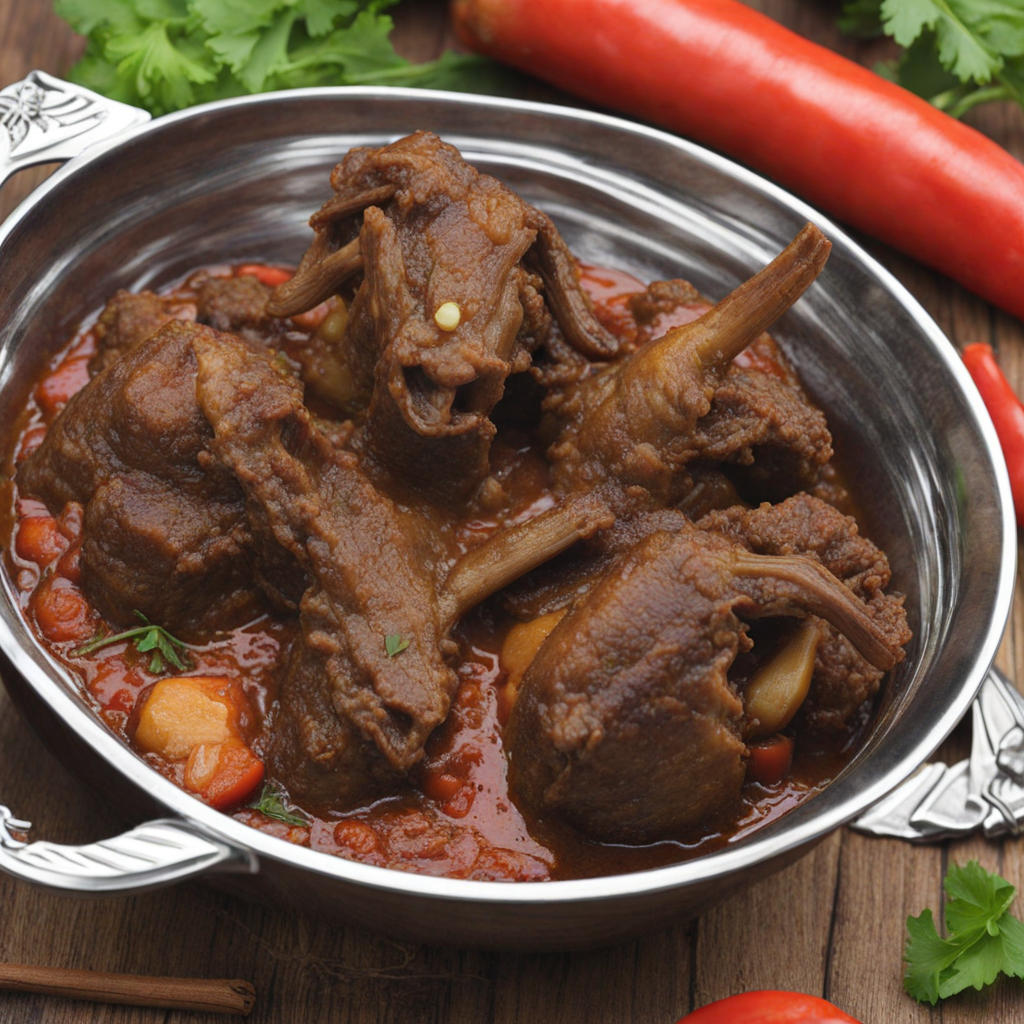Asun
Asun is a vibrant and spicy Nigerian dish that showcases the rich flavors of grilled goat meat. The meat is typically marinated with a blend of spices, including chili peppers, onions, and traditional seasoning, which infuses it with a deep, smoky flavor. Once marinated, the goat meat is skewered and grilled over an open flame, allowing it to develop a beautiful char while retaining its tender texture. The result is a dish that is both succulent and bold, perfect for those who enjoy a kick of heat in their meals. What sets Asun apart is not just its flavor profile but also the accompanying garnishes that elevate the dish. It is often served with a sprinkle of sliced onions, bell peppers, and a squeeze of fresh lime or lemon juice, adding a refreshing contrast to the spiciness of the grilled meat. This combination of textures and flavors creates a delightful eating experience, making Asun a popular choice for gatherings and celebrations in Nigeria. The dish can be enjoyed on its own or paired with sides like rice, yam, or plantains, making it versatile for various palates. Asun is more than just a meal; it embodies the spirit of Nigerian cuisine, where communal eating and sharing are celebrated. This dish is often enjoyed at parties and festivals, drawing people together over its irresistible aroma and taste. Whether you're a seasoned lover of spicy food or a curious adventurous eater, Asun promises to take your taste buds on a delicious journey through the heart of Nigerian culinary traditions.
How It Became This Dish
The Flavorful Journey of Asun: Nigeria's Spicy Goat Meat Delight Asun, a tantalizing dish made from spicy roasted goat meat, holds a special place in the hearts and palates of Nigerians, particularly among the Yoruba people. This dish is more than just food; it is a vibrant representation of cultural heritage, social gatherings, and the culinary prowess of Nigeria. To understand the full significance of Asun, we must delve into its origins, cultural relevance, and its evolution over time. #### Origins of Asun The origins of Asun can be traced back to the Yoruba people of southwestern Nigeria, a region known for its rich culinary traditions and diverse ingredients. Goat meat has been a staple in the diets of many West African communities for centuries, prized for its flavor and versatility. The Yoruba, in particular, have long embraced goat meat, often using it in various traditional dishes such as pepper soup and stews. The term "Asun" itself comes from the Yoruba language, where "asun" means "roasted." The dish typically involves marinating goat meat in a spicy mixture before skewering it and roasting it over an open flame or charcoal grill. The result is a smoky, aromatic dish that is as visually appealing as it is delicious. Traditionally, Asun is prepared during special occasions, family gatherings, and festive celebrations, making it a dish deeply intertwined with communal and familial bonds. #### Cultural Significance Asun is not merely a dish; it embodies the spirit of Nigerian hospitality and the importance of community. In Yoruba culture, sharing food is an integral part of social interactions. Asun is often served at weddings, birthdays, festivals, and other significant life events. It fosters community spirit and brings people together, transcending social and economic boundaries. The preparation of Asun is also a communal activity. Families often gather to prepare the dish, with each person contributing their unique touch to the marinade or cooking process. This collective effort strengthens familial ties and preserves culinary traditions passed down through generations. The ritual of cooking and sharing Asun reflects the values of togetherness, celebration, and gratitude, making it a cornerstone of Yoruba cultural identity. The dish's significance also extends beyond the Yoruba community; it has gained popularity among other ethnic groups in Nigeria. Asun has become a favorite at street food stalls and upscale restaurants alike, showcasing its versatility and widespread appeal. It is often paired with sides like yam, plantains, or rice, enhancing the overall dining experience. #### Development Over Time Asun's evolution is a testament to the dynamic nature of Nigerian cuisine. While the traditional preparation methods remain largely unchanged, contemporary influences have introduced variations that cater to modern tastes and lifestyles. For instance, in urban centers like Lagos, Asun is often prepared in a more refined manner, integrating international culinary techniques while still retaining its authentic flavors. The rise of the street food culture in Nigeria has also played a significant role in popularizing Asun. Street vendors have made this dish accessible to a broader audience, often serving it alongside cold drinks, making it a go-to snack for many. This shift has not only contributed to the dish's popularity but has also encouraged culinary innovation, with vendors experimenting with different marinades and cooking styles. In recent years, Asun has gained international recognition, appearing on various food platforms and social media, which has further amplified its appeal. Food bloggers and influencers have embraced the dish, showcasing its preparation and flavor profiles, allowing a global audience to appreciate this unique Nigerian delicacy. Additionally, Asun has found its way into fusion cuisine, where chefs blend traditional Nigerian flavors with global culinary influences. Variants such as Asun tacos or Asun sliders have emerged, catering to the adventurous palate while still honoring the dish's roots. This adaptability highlights the resilience and creativity of Nigerian cuisine, ensuring that Asun remains relevant in an ever-changing culinary landscape. #### The Ingredients: A Symphony of Flavors The allure of Asun lies not only in its preparation but also in its ingredients. The primary component is, of course, the goat meat, which is favored for its rich flavor and tenderness. The marinade typically consists of a blend of spices, including ground pepper, garlic, ginger, and other local herbs, creating a robust flavor profile that defines the dish. The grilling process adds an additional layer of complexity. Cooking over an open flame infuses the meat with a smoky aroma that complements the spicy marinade. The result is a dish that is both fiery and fragrant, appealing to those who enjoy bold flavors. The accompaniments to Asun also play a crucial role in enhancing its overall experience. Sides such as fried plantains, jollof rice, or yam provide a balance to the heat of the meat, creating a satisfying and wholesome meal. Often, Asun is served with a spicy dipping sauce or a side of fresh vegetables, allowing diners to customize their experience according to their palate. #### Conclusion Asun is more than just a dish; it is a celebration of Nigerian culture, community, and culinary artistry. Its origins in the Yoruba community highlight the significance of goat meat in traditional diets, while its evolution showcases the adaptability of Nigerian cuisine to modern trends and tastes. Asun serves as a bridge between generations, linking the past with the present and ensuring that the rich culinary heritage of Nigeria continues to thrive. From its humble beginnings as a traditional dish to its current status as a beloved street food and a trendy culinary item, Asun has carved a niche for itself in the gastronomic landscape of Nigeria and beyond. As it continues to evolve, one thing remains constant: Asun will always be a symbol of togetherness, celebration, and the rich tapestry of flavors that define Nigerian cuisine. Whether enjoyed at a family gathering, a street food stall, or a high-end restaurant, Asun invites everyone to experience a taste of Nigeria's vibrant culinary heritage.
You may like
Discover local flavors from Nigeria







